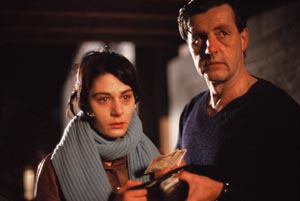Sarajevo 2004, the war has been over for years, but it still holds thirty-year-old
Senada hostage. Her daughter, Aida, has been listed as missing for nine
years, but Senada has not yet forsaken the hope that she is alive. She
clings in despair to a vague sign, in spite of the fact that her ex-husband,
Samir, and her friends encourage her to finally let it go and try to build
a new life. But Senada refuses to give up. When she finds evidence that
the Red Cross flew children out to Germany during the war, she follows
the trail immediately and arrives after a long journey at Stuttgart. She
is rewarded there for her stubborn determination: Aida had actually been
brought to Germany. However, the then two-year-old girl was given up for
adoption, under the assumption that her parents were dead.
The life of the German family, Heinle, and their eleven- year-old daughter,
Kristina, is suddenly shaken by its roots when they learn that the mother
they thought was dead is alive and wants her daughter back. The Heinles
are confused. They love their daughter more than everything and cannot
conceive of losing her.Senada is reunited with her daughter, who is happy,
firmly rooted in her new life, and no longer even able to speak the native
language of her natural mother. Senada is confronted with a difficult
decision: should she insist on the return of her daughter, thereby wrenching
her from her social circumstances and life in Germany, or return alone
to Bosnia in the knowledge that her daughter is alive and doing well?
A modern, passionate film-story of a strong woman ill-served by Destiny, but who nonetheless forges on. “Warchild” weaves its tale by use of the characters’ tension and gestures, as well as the suppressed and unspoken emotions of the protagonist, creating along the way a gripping family constellation along the lines of the Scandinavian narrative, and a magical ending. In spite of the intensity, the anxiety and drama result in total “relief” for Senada at the end.
" This second feature film by German director Christian Wagner’s Balkan Blues Trilogy is one of those rare war films, like “Apocalypse Now” and “Hiroshima Mon Amour,” that makes brilliant use of symbolism. The award-winning picture follows the riveting misfortunes of Senada, a 30-year-old mother who lost her 2-year-old daughter during the Bosnian conflict. Ten years after the disappearance, she goes on a hunt to find her daughter and, in effect, a resolution to all she has lost to the war. " review by T. Straus, San Francisco Chronicle 08-2008


